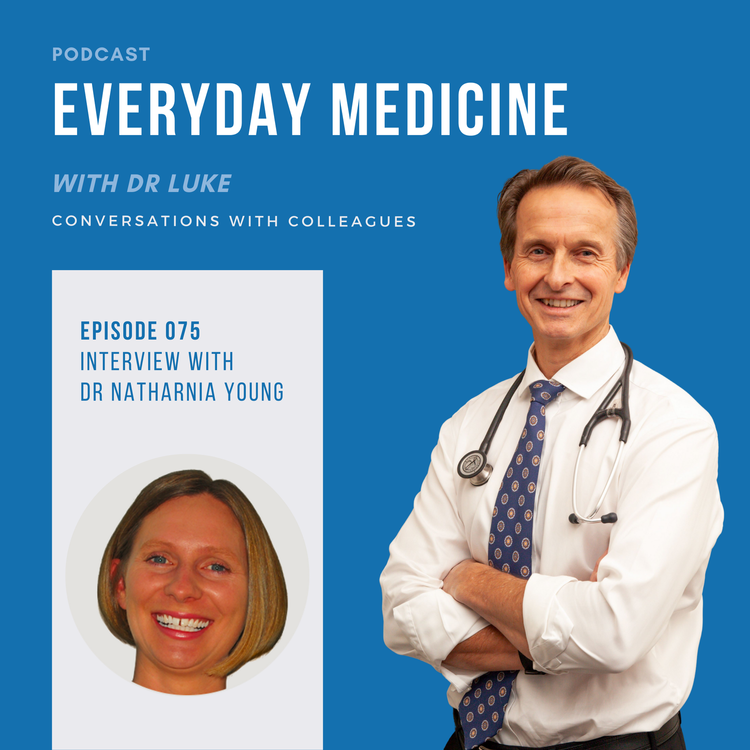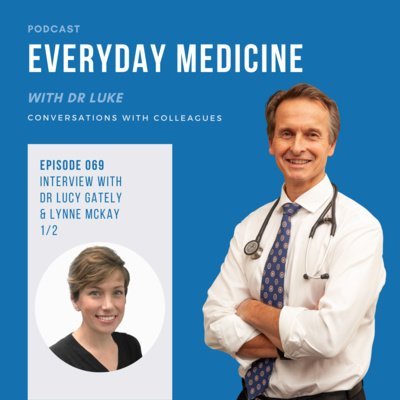Everyday Medicine by Dr Luke Crantock
Conversations with colleagues providing helpful ideas and advice in healthcare
Episode 160. Motor Neuron Disease (MND) with Associate Professor Ernie Butler (Part 2)
Motor neuron disease (MND) refers to a group of relatively rare neurodegenerative diseases in which motor nerves in the spine and brain lose function over time.
Episode 159. Parkinson's Disease with Associate Professor Ernie Butler (part 1)
In this episode, we delve deeply into Parkinson’s Disease (PD), a progressive neurodegenerative disorder primarily impacting dopamine-producing neurons in the substantia nigra.
Episode 158. Forest Ecology, Bush Fires and Health with Professor David Lindenmayer
It’s difficult to walk through an old-growth natural forest anywhere in the world and not feel awe and a connection to the majesty of our beautifully stunning Earth, however, when these amazing ecosystems burn as forest fires the consequence has devastating outcomes for affected communities.
Episode 157. Globus and Cough with Dr Andrew Martin (part 3)
Globus, a persistent or intermittent sensation of a lump or foreign body in the throat, is a well-defined clinical symptom. Though it is non-painful, it can be long-lasting, difficult to treat, and prone to recurrence. Interestingly, this sensation often improves with eating and typically does not accompany dysphagia (difficulty swallowing) or odynophagia (painful swallowing).
Episode 155. Allergic Rhinitis and Sinusitis with Dr Andrew Martin (part 1)
Rhinitis, Sinusitis, and Rhinosinusitis are common conditions frequently seen in primary care. Studies indicate that 1.4 out of every 100 general practice encounters involve acute or chronic sinusitis, and over 2 million Australians are estimated to suffer from chronic rhinosinusitis. In some studies, this condition has shown a greater impact on social functioning than chronic heart failure, angina, or back pain.
Episode 78. New Agents in Rheumatology with Dr Andrew Teichtahl
The past two decades have witnessed dramatic changes in the approach to managing rheumatologic conditions, born of a wider understanding of cellular biology, immunology, and the pathophysiology of inflammation we have consequently seen an explosion in the development and availability of both Biologic medications and small molecules for medical applications.
Episode 77. The Microbiome with Dr Mark Morrison
Trillions of microbes are living in and on us, a thriving ecosystem of bacteria, viruses, archaea and fungi. Collectively these microbes form the human microbiome and this microbiome appears to play a key role in many aspects of health, crowding out harmful microbial invaders, breaking down fibrous food into digestible compounds and producing some essential vitamins such as B12 and vitamin K. New research is exploring the relationship between the gut microbiome and immunogenicity, autoimmune inflammatory diseases, neoplasia and brain development and is searching ways to correct dysbiosis.
Episode 76. Breast Cancer with Dr Corinne Ooi
Breast cancer affects 1 in 7 women and remains the most diagnosed cancer in Australia with 57 new cases diagnosed each day, 1000 new cases per year and tragically 2000 deaths annually. Men are not excluded, for every 100 breast cancers one is diagnosed in a male. Genetic links for breast cancer such as the BRCA 1 and 2 genes receive significant attention but account for only 5% of total cases,75% of patients have no family history and additionally 75% of breast cancers are diagnosed in patients 50 years or older. Multiple risk factors including family history, young age of menarche and older age of menopause are frequently cited but less well known is the association with obesity which is responsible for up to 8% of all breast cancers. It is estimated that 1: in 4 cases of all breast cancer may be prevented with attention to known modifiable risk factors. Breastfeeding and earlier age of pregnancy are both protective factors.
Episode 75. Urinary Incontinence in Women with Dr Natharnia Young
Dr Natharnia Young is a leading urogynaecologist servicing South Eastern Melbourne’s suburbs and joins this conversation to discuss urinary incontinence in women, a condition associated with significant personal and social stigmatisation and affecting up to 1:2 women over the age of 70.
Episode 74. Sports Medicine and Supplements with Dr Peter Brukner
Dr Peter Brukner OAM is Professor of Sports Medicine at the Latrobe Sport and Exercise Medicine Research Centre and is one of Australia’s most respected and best-known specialist sports physicians with a wide breadth of knowledge of the subject. He has extensive experience, having enjoyed a stellar career with elite sports teams and Olympians over multiple decades in his professional capacity.
Episode 73. Sports Medicine and Low Carbohydrate Diet with Dr Peter Brukner
Dr Peter Brukner OAM is Professor of Sports Medicine at the Latrobe Sport and Exercise Medicine Research Centre at Latrobe University and is one of Australia’s most respected and best known specialist sports physicians. He has a deep breadth of knowledge and experience and was a founding partner at the Olympic Sports Medicine Centre in Melbourne as well as a sports physician to the Collingwood and Melbourne AFL clubs, Liverpool Football Club and has served as team doctor to the Australian cricket team, Socceroos and several Olympic teams. He has authored multiple best-selling books on sports medicine and more recently has become interested in the important relationship between lifestyle and health and after determining that he was pre-diabetic he embarked on a low carbohydrate ketogenic style diet. He has subsequently become a strong advocate of the low carbohydrate diet both in managing a healthy BMI and avoiding development of the metabolic syndrome and all its consequent health effects and authored the very popular and best-selling book A Fat Lot of Good. He energetically has also established the not for profit campaign Sugar By Half. He joins us today to discuss his experience and journey to a low carbohydrate diet and how such an approach may be highly beneficial to athletes of both amateur and elite persuasions. Please enjoy this podcast.
Special Episode 9. New Vaccines with Professor Dale Godfrey
The Peter Doherty Institute was the first Australian laboratory to establish a Covid 19 PCR test and diagnose the first SARS- Cov 2 infection on Australian shores, its research scientist is heavily involved in developing novel diagnostic tools applied across many areas of medical science and the institute plays a key leadership role in advising state and federal government on best medical practice. It’s no great surprise therefore that we have learned of their ground-breaking development of a new subunit Covid 19 vaccine utilising the receptor binding domain at the tip of the virus’s spike proteins. This is the region responsible for virus attachment and infection and for eliciting over 90% of neutralising antibodies following SARS Cov-2 infection. Parallel with the subunit vaccine development, another Melbourne group – the Monash Institute of Pharmaceutical Sciences has developed a similar vaccine but using mRNA technology copying the virus’s genetic sequence that codes for the receptor binding domain.
Episode 72. Breaking Bad News and Admitting Error with Dr Bill Shearer and Dr Alan Saunder
Delivering hard news to a patient or their relatives and admitting error can be one of the most difficult duties encountered by a doctor. Significant effort is now spent in teaching young training doctors techniques and strategies to avoid miscommunication and uncertainty in undertaking this complicated task whilst also remaining emotionally engaged and empathetic to their situation.
Episode 71. Chronic Pain with Dr Stephen Nutter
Chronic pain affects about 1 in 5 people in Australia and is a common reason for patients to see their doctor and to seek treatment. As patients seek ever increasingly strong pharmacological therapies they may become increasingly depressed, fatigued and dislocated from society.
Episode 70. Familial Cancer Screen with Dr Lucy Gately - Part 2
Genetic testing for cancer is important for a small number of families at increased risk due to the inheritance of genetic mutations. Most commonly this involves the inheritance of breast cancer genes such as the BRCA 1 and 2 or colorectal cancer genes such as the Lynch syndrome genes. Although these only represent a small percentage of total cancers reported there is significant public interest in these syndromes.
Episode 69. Familial Cancer Screening with Dr Lucy Gately and Lynne McKay - Part 1
In the context of family cancer screening, genetic testing looks for specific inherited changes or variants in a person’s genes which may predispose them to an increased risk of developing a neoplasm. Harmful variants in some genes are known to be associated with an increased risk of developing specific cancers such as mutations to the BRCA 1 and 2 genes associated with breast and ovarian cancer and the Lynch genes associated with colorectal and endometrial cancer.
Episode 68. The Ketogenic Diet with Dr Rod Tayler
The ketogenic diet has recently become popular as an effective dietary approach to weight loss. The diet restricts carbohydrates to just 5-10% of total calories and relies on caloric intake from fats (55-60%) and proteins (30-35%) forcing metabolism to shift from gluconeogenesis to ketogenesis with the production of acetoacetate, beta-hydroxybutyrate and acetone – ketone bodies – as the usable energy source. People adopting this diet report a significant reduction in hunger, increase in energy, clarity of thought and reduction in chronic inflammatory conditions. Some are concerned the diet is difficult to maintain long term and may be risky in patients that are diabetic and in those with chronic kidney disease.




















